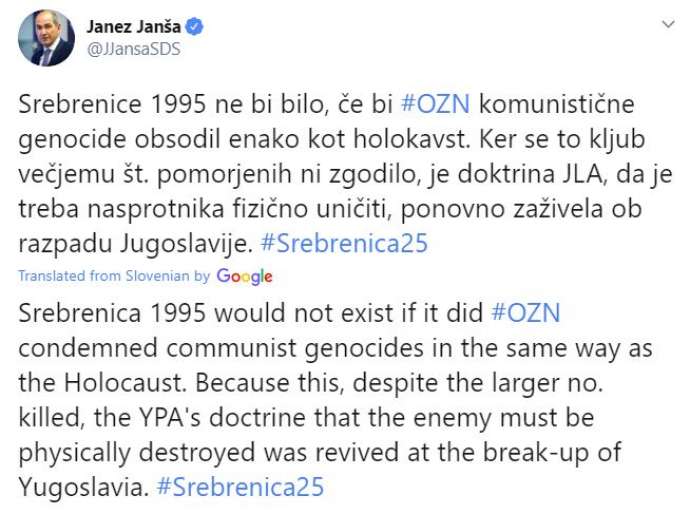STA, 13 July 2020 - Prime Minister Janez Janša defended his statements regarding the Srebrenica genocide on Monday as the opposition Left and Social Democrats (SD) walked out of the National Assembly session over his refusal to apologise for his comments that have been met with criticism in Bosnia-Herzegovina.
Janša wrote a series of posts on Twitter over the weekend to the effect that the Srebrenica genocide would not have happened if the United Nations had condemned Communist crimes the same way they had condemned the Holocaust.
He argued that the perpetrators of the Srebrenica genocide, helmed by Bosnian-Serb General Ratko Mladić, had drawn from lessons they had learnt in Yugoslav military schools - that the enemy must be not just defeated but destroyed.
Clarifying his position at the National Assembly today, Janša noted how he had written a study in 2009 analysing the events after the fall of the Berlin Wall, including the developments in the former Yugoslavia in the run-up to the Srebrenica massacre.
Based on this study he had been selected to lead an international initiative to amend the United Nations resolution on genocide, which received the backing of 100 world leaders in 2012.
Since 2009 he says he has referred to this study every year on the anniversary of the Srebrenica massacre, and he continues to insist that the UN resolution should be amended.
"There would be no Srebrenica, no Rwanda or many similar genocidal acts around the globe if the world was able to condemn all crimes regardless of which ideology prompted them," he said.
"And this is the shortcoming of the world order, this is why we are striving to appropriately amend the UN resolution. As long as it is possible to kill with impunity in the name of one ideology and be condemned when doing it in the name of another ideology, genocides will happen in the world.
"There is consensus about that in the civilised world, nobody objects to that, except in Slovenia," he said.
Janša also pointed out that when he was defence minister in the early 1990s, Slovenia had helped Bosnia diplomatically, by training their troops and by supplying arms. If that had not been the case, "there would be five times more Srebrenicas, at least," he said.
Janša made the statement after he was called upon by the Left and SD to apologise for his comments. Because he did not, MPs of both parties walked out of the parliament's chamber.
The opposition criticised the Twitter comments as inappropriate and insulting.
Left MP Miha Kordiš said Janša was in fact pursuing the same policies that led to the Srebrenica massacre, while LMŠ leader Marjan Šarec warned his statements would tarnish Slovenia's reputation abroad.
Even some coalition MPs were critical, including parliamentary Speaker Igor Zorčič of the Modern Centre Party (SMC), who said such reinterpretation of history could damage Slovenia's reputation.
Pensioners' Party (DeSUS) MP Franc Jurša said it was not right to use the anniversary of the genocide to speak about something "related to a different matter in history".
Janša was critical later on Twitter of the MPs who walked out of the session. "They left the session because they are incapable of facing their racism. Because they are not capable of condemning all crimes, but only those that were not perpetrated by their role models," he wrote.
Meanwhile, Janša's tweets prompted two MEPs of the LMŠ, Irena Joveva in Klemen Grošelj, to write to European Parliament President David Sassoli, asking him to take the necessary political initiative and start a serious political debate on what is a wider issue.
They argued "the abuse and politicisation of the Srebrenica genocide for exclusively internal ideological and party purposes of Slovenia's PM Janša is only the top of the iceberg of what is a wider and very worrying trend of historical revisionism and relativism brought by the worrying rise of far right and populist force across the EU".






